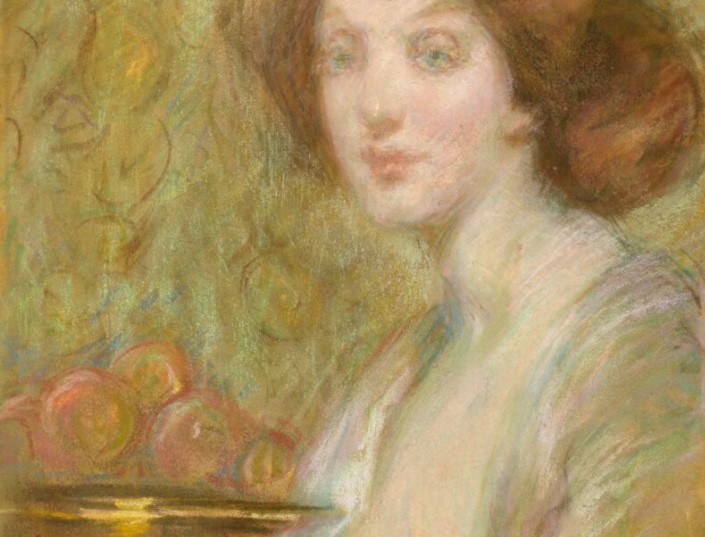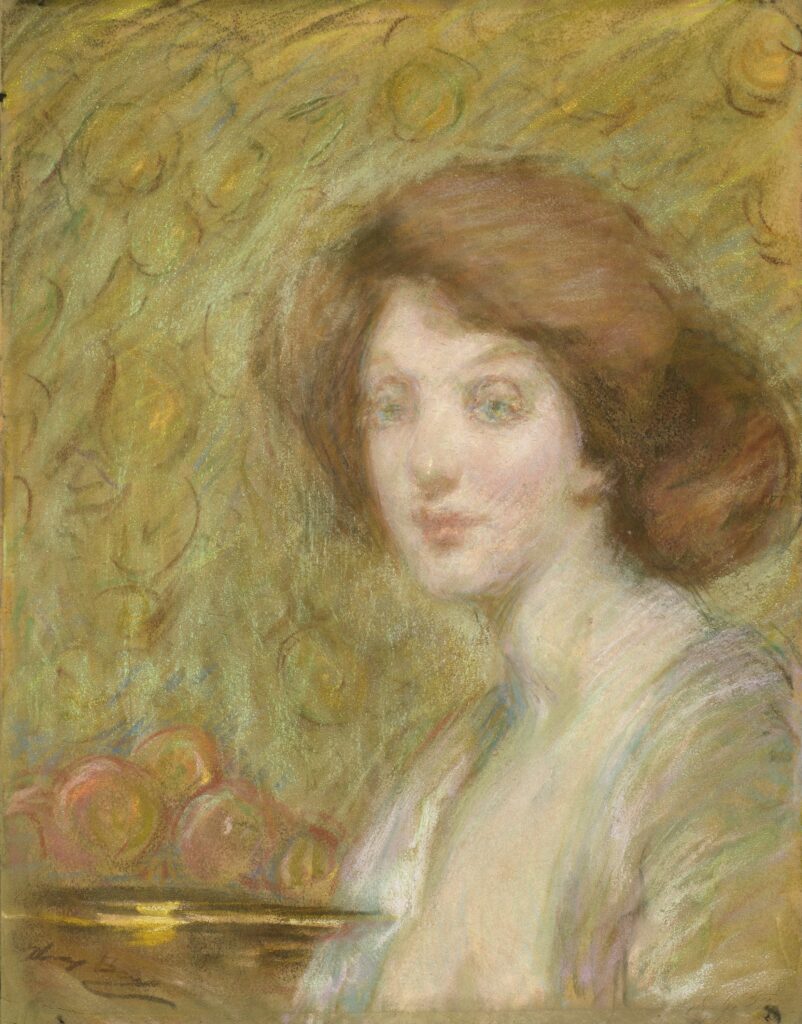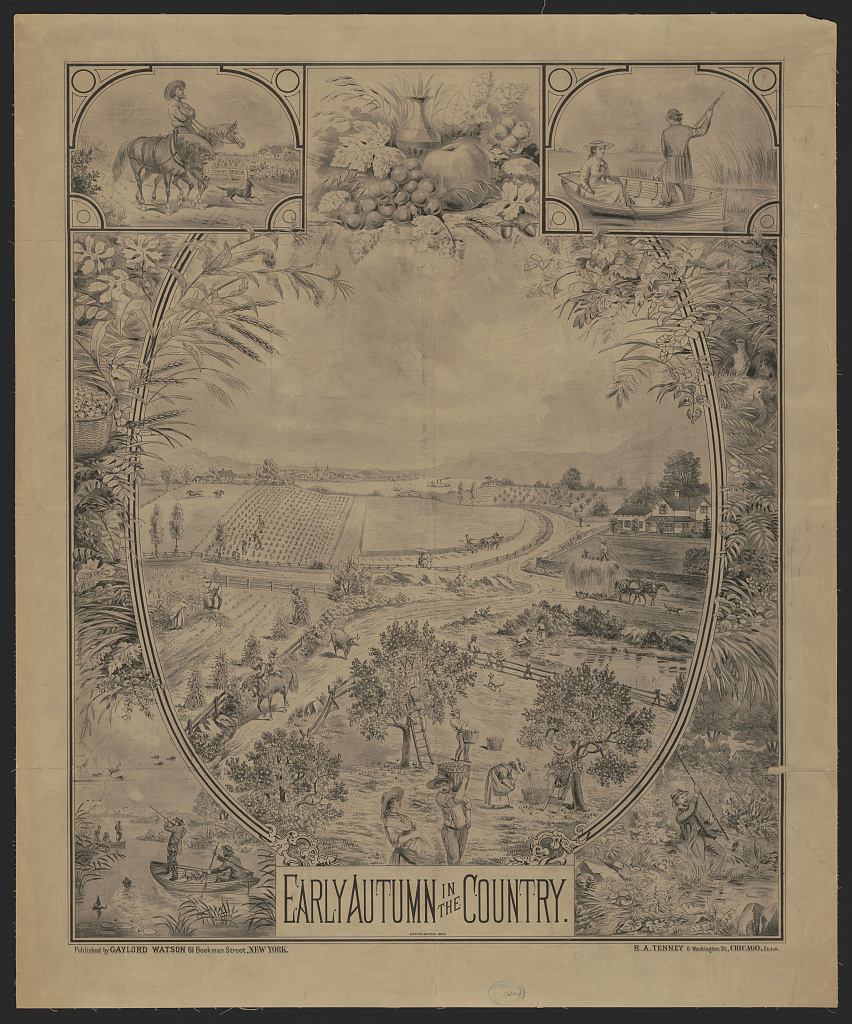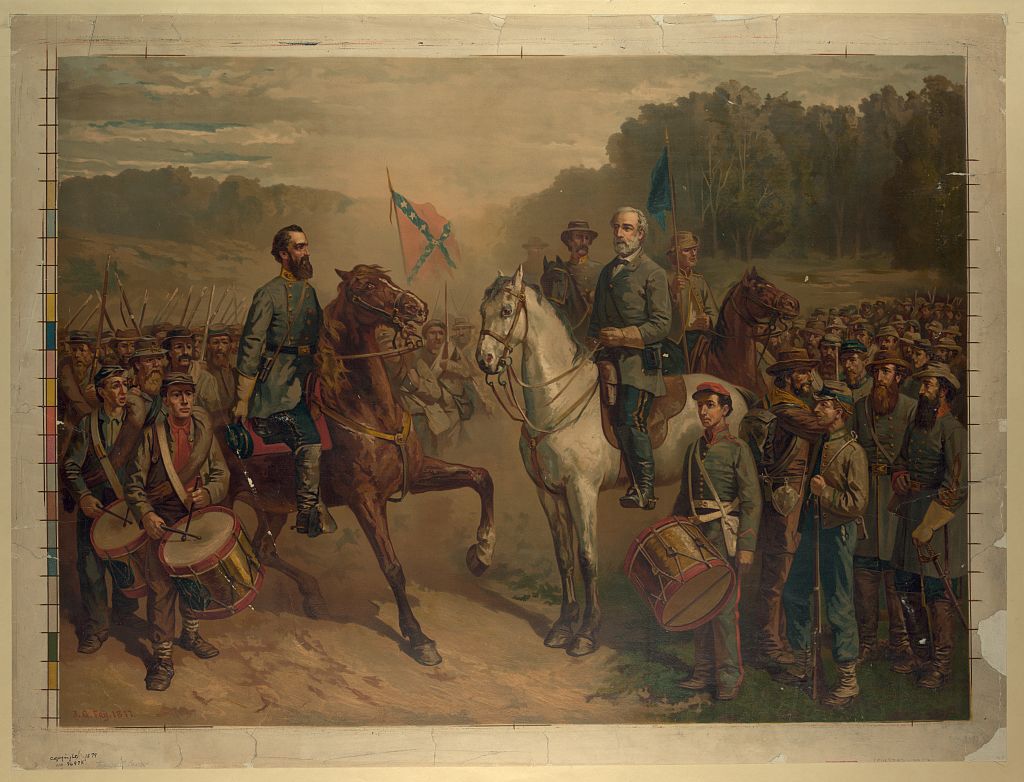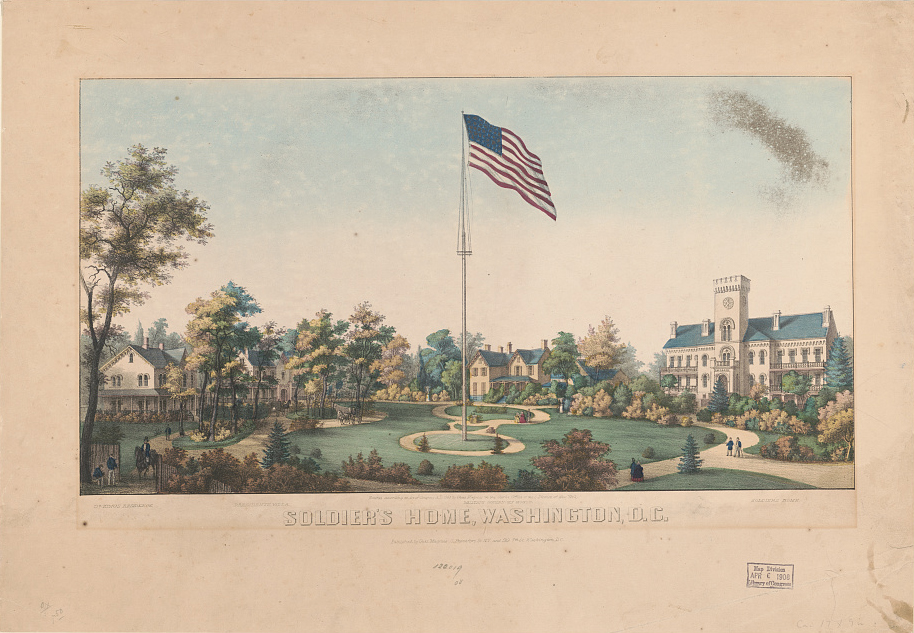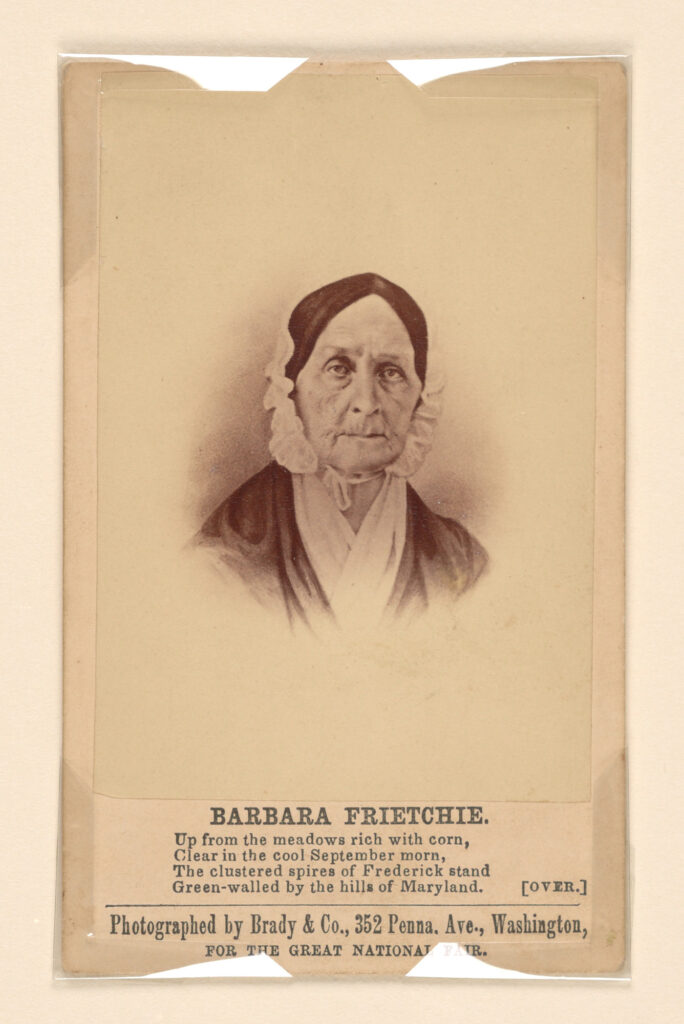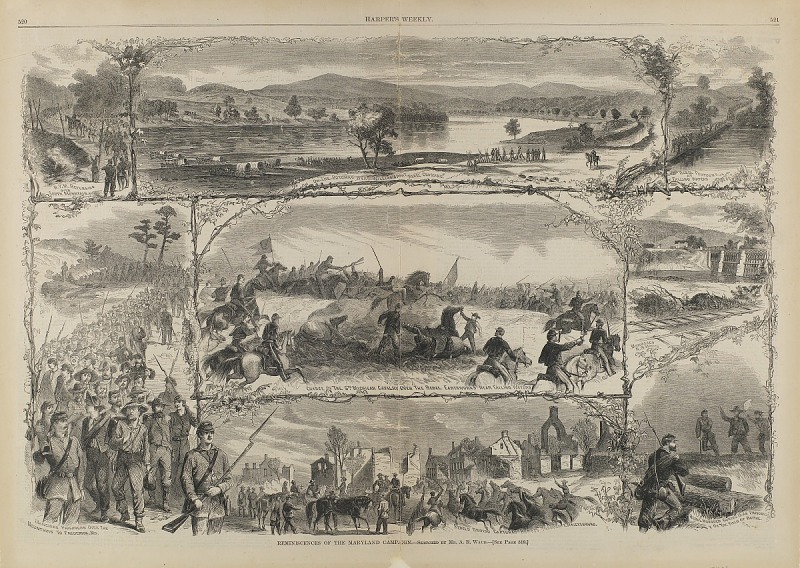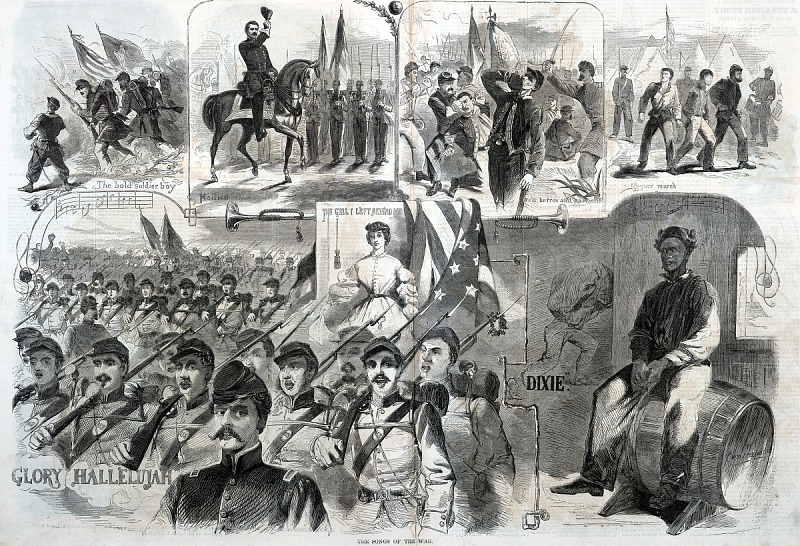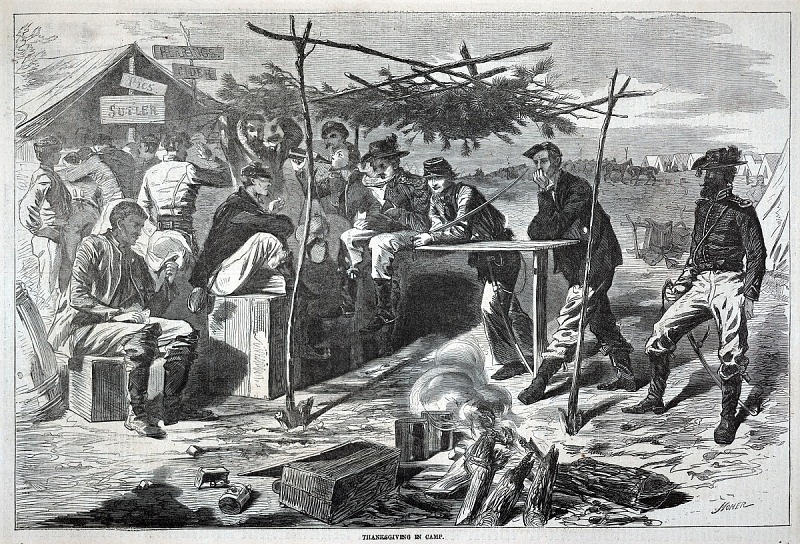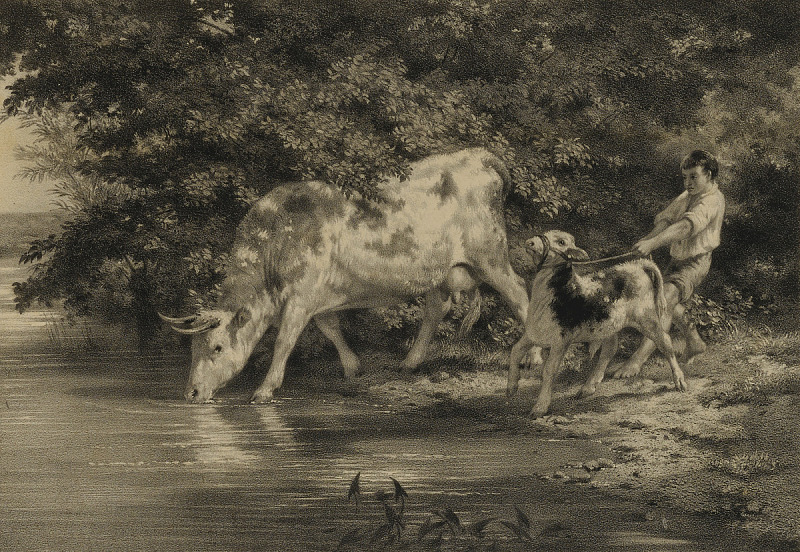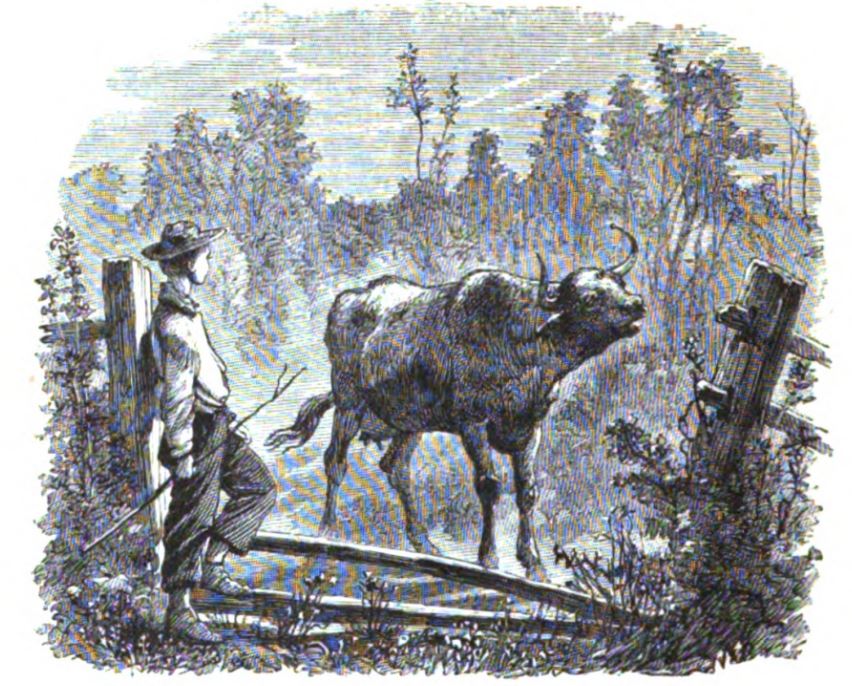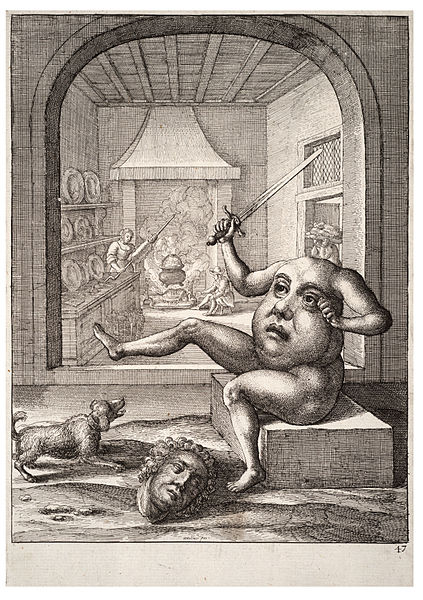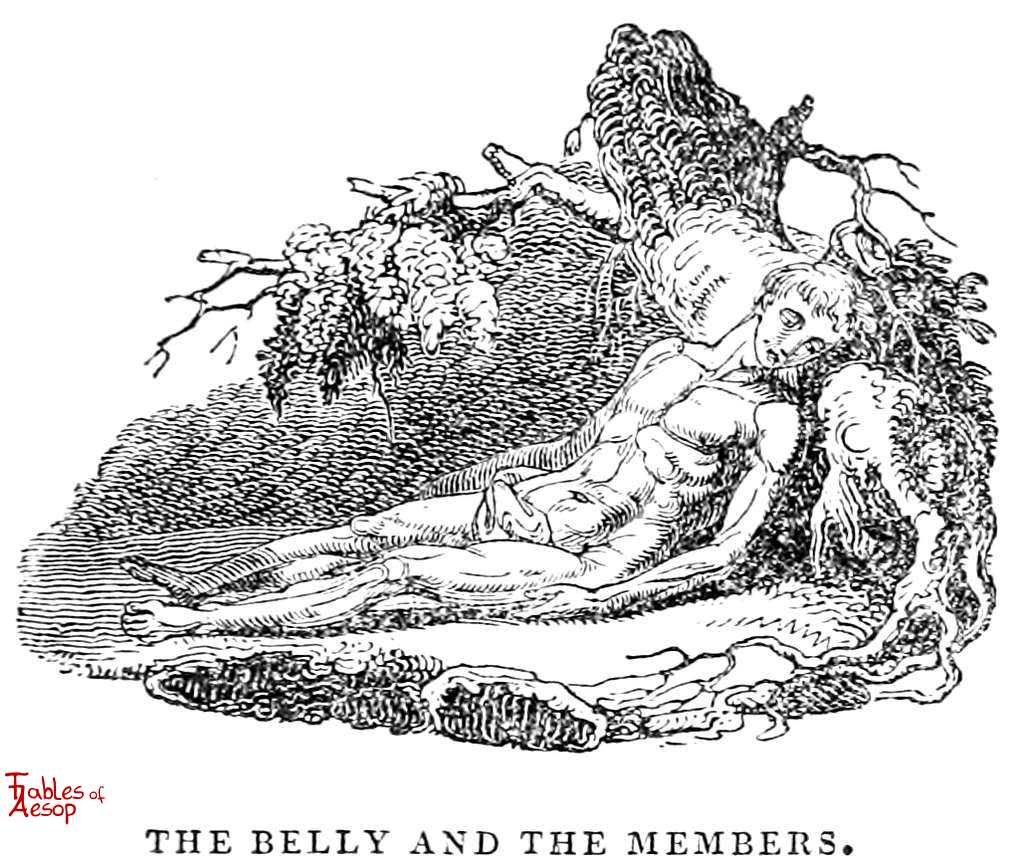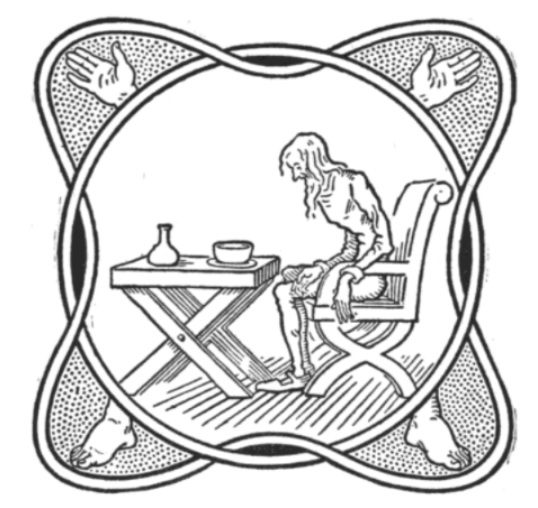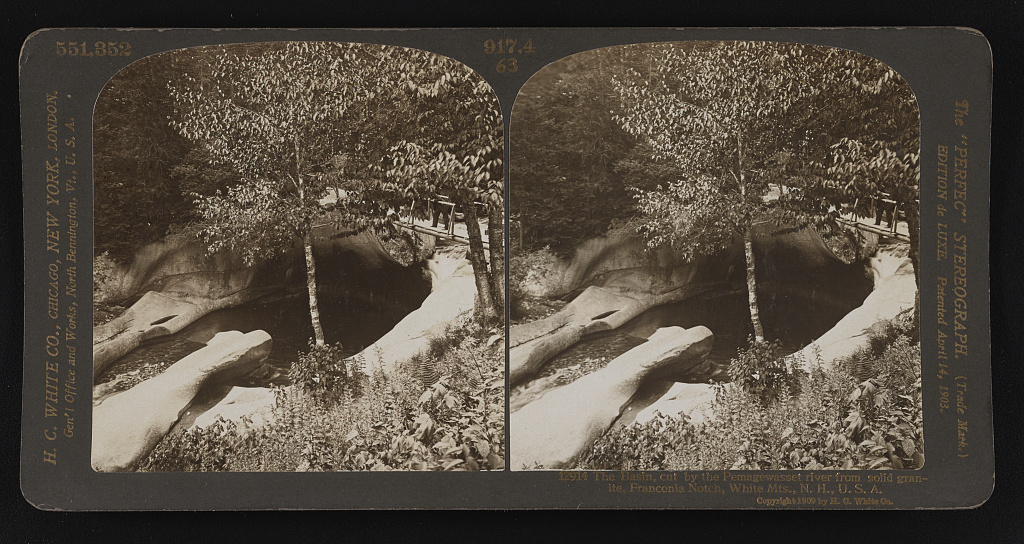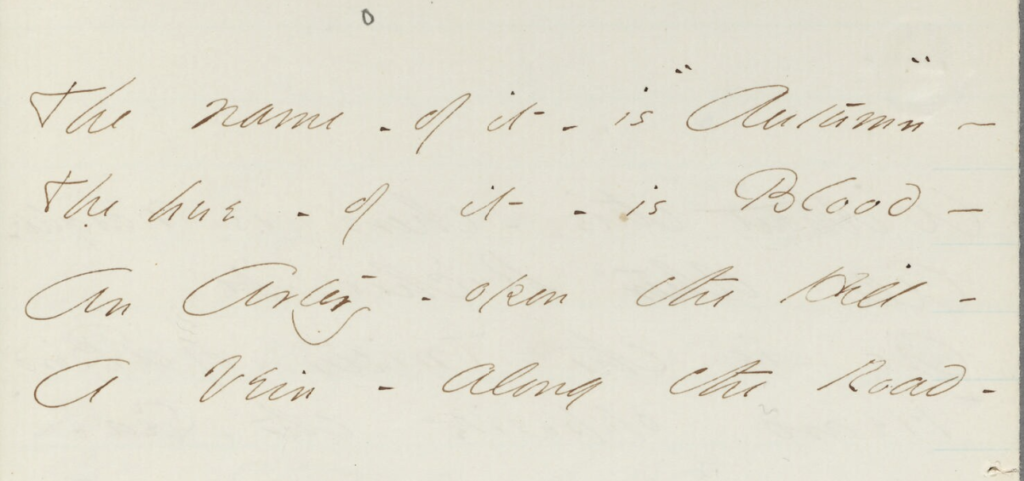The Cat’s Diary
By Mrs. A. M. Diaz
Annotations by Kathryn T. Burt
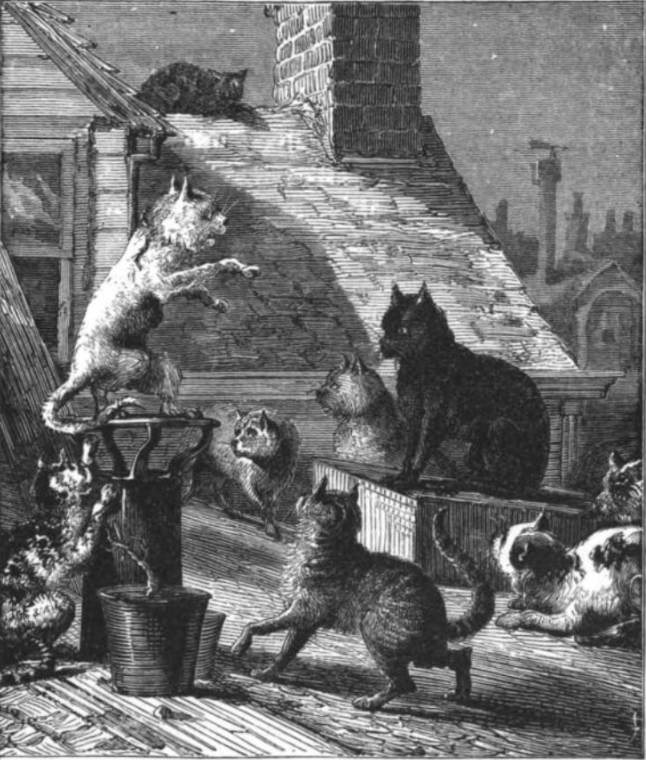
To-day I must keep myself hid. A loaded gun stands behind the door. The shots are intended to go through my body.
“Scat!” is an odious[1] word. It has a sound which no cat can endure. Why are people so rude? Gentleness is pleasing to all. It does me no good, all this rough treatment. I do not need to be driven out. If they would but open the door and point,—why, I trust I can take a hint. I am not the cat to stay where my company is unwished for. But they stamp. But they stamp. They cry, “Scat! Scat!” They use the broom, and I hurry away to hide myself and my tears. I hurry to the garden. There, in shady corners, where juicy catnip grows, I meet my friends. We tell one another our wrongs, and mourn together.
When the king of the cats comes,—which is always at night,—we assemble upon some convenient roof, and pour forth our sorrows. These are called the Nights of Lamentation[2]. We use, then, the real court language, which is part Egyptian; for we sprang from an Egyptian race[3].
The king of the cats is brave, but full of pity. He has told us that, when every dog has had his day, then the days of the cats will begin. It will then be his first duty to abolish[4] mouse-traps. To him we have to give an account of all our actions,—how many mice we gave caught, how many we have smelt, whether we have charmed any birds, sucked eggs, stolen new-born chickens, scratched small children, or licked the butter.
Last night he came, and we assembled by starlight on the gentle slope of a roof. There were many present. The place was convenient; the dogs were chained up, the bad boys were put to bed, the brooms behind the door.
First, the members had to be seated. Lady Maltese had caught seventeen mice, the highest number, and was therefore shown to a seat on the ridgepole. Her husband, Sir Tom Maltese, having fought a bloody battle with a rat, was allowed to touch noses with the king. To him was given the highest place,—the top brick of a chimney. The young Miss Whiteys, twins, came dressed exactly alike, in white fur with black trimmings. They were full of frolic, racing and tumbling, and always in the way. These young persons were requested to take a back seat; and old Ma’am Mouser, who never had a family of her own, offered to make them behave. Poor Madame Purr was full of sorrow; for her whole family had just been drowned. She came in dark slate-colored furs, and preferred a low seat, where her weeping would not be observed. Miss Whitefoot, who had discovered a new way of opening pantry doors, was loudly welcomed, and seated on the martin-house. Mrs. Loudmew, by great watchfulness, and by finding good hiding-places, had succeeded in raising her whole family. Not one had been shot or drowned. To her was given a very high seat,—the top round of a ladder, leading to the roof above.
The King had a central position on the scuttle window[5].
Sweet Kitty Gray, who lives in our yard, had a question to ask, and was requested to stand on the end of the stove funnel[6]. She wished to know whether, when a small child swung her over his shoulder by her tail, she should scratch or only mew. This question being left for us all to answer, we cried out, with one voice, “Mew, mew!: But, being asked which we ourselves did on such occasions, all remained silent. For none wished to be so impolite as to speak first.
After several had spoken of their trials, a lean, dingy, sorrowful cat of unknown color, a stranger to all present, asked permission to relate her story. Her smellers[6] having been examined, she was declared worthy to speak in court, and, being unable to mount the funnel, was requested to step a little forward from the ring. She advanced with trembling steps, and began her story as follows:—
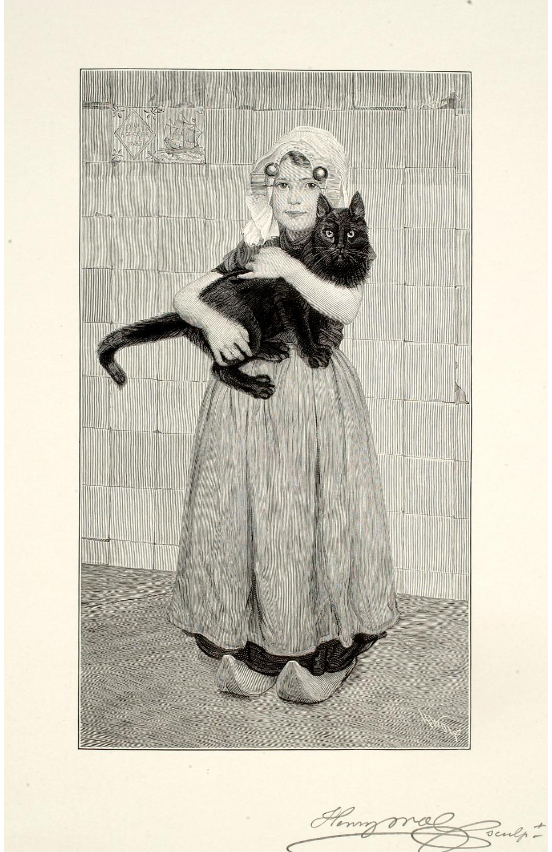
“I was once pure white,—whiter than the white meat of a chicken,—whiter than new milk. This dirty string about my neck was then a beautiful blue ribbon, tied in a bow.
“O my friends, of blue ribbons, new milk, and chickens’ meat I have now only the memory!” (Here the court were much affected.) “In those pleasant days, my name was Happy Minty. A lovely child held me in her arms. A soft bed was made up for me near her own. It has a spread. The sheets were marked ‘ H. M.’ I was taken to ride in a coach of silk velvet, and with feathers in my hat. With her own hands the lovely child fed me with frosted cake, and warmed for me the delicate vanilla ice-creams. O how sweet were those days of my youth! But alas! I grew,—grew in wisdom, grew in size. Ah, why was it expected of me always to be a kitten? Why was I urged to chase my own tail, after I had seen the folly of it?”
Here we all exclaimed, in court language, “Ah, why?” “Ah, why?”
But the king of the cats waved his tail, and commanded silence.
O, nothing can be more beautiful than the pure black of our king[7], unless it be the majestic yellow of his large round eyes. And then he is so grand and stately! Not one speck of white! for, if but one white hair were discovered, he would be known as an imposter, and no true king, and would be eaten by dogs.
When silence was restored, the unhappy stranger went on with her story.
“There came,” said she, “or was brought to the house, a new kitten. A meddlesome, per young miss; not pretty, for she was neither pure white, nor a royal black, nor a soft Maltese, nor a genteel gray, but an odious yellow!”
Here sweet Kitty Gray trod on the tail of Happy Minty, to hush her. But it was too late. The words had been spoken. A furious yellow cat leaped down from the rain-water spout, but up his back, and with much sputtering demanded whether he were to be insulted in open court. This caused great confusion. The king, after restoring order in his usual happy manner, remarked that it was very plain the stranger was not aware the gentleman in yellow was present. Still, as he felt himself insulted, if it would be any satisfaction to him to claw her, he might have that satisfaction.
Happy Minty, who had been looking very steadily at the gentleman in yellow, at last said to him, quite gently:—
“Excuse me sir, for gazing at you so boldly. It is because of your fine appearance. Mere color is nothing. How stately is your form! How firm your tread! What magnificent whiskers! You must have come from some nobler race. Born with so much strength and grace and courage, I really must believe you were also born—without claws[8].”
Here young Miss Whitey put up her paw and winked behind it at sweet Kitty Gray, and then winked at her sister, and her sister winked at her; and they fairly twisted themselves heels over head, that they might not die of laughing. A box[9] on the ear soon quieted them.
The gentleman in yellow, however, seemed quite pleased at being praised so highly; said he had perhaps misunderstood the interesting stranger, and begged she would proceed with her story. He then gallantly[10] conducted sweet Kitty Gray to her seat on a flower-pot, saying, as he did so, that no lovelier flower ever bloomed there. He seemed much pleased with this young person. Everyone is. And no wonder, seeing that she is so pretty and gentle in all her ways. After we had gone home, I heard him singing to her a serenade. It was in the court language, which, as I said before, is part Egyptian.
"O lovely creature!
How elegant is your form!
How graceful your motions!
The fall of your feet is like the falling of snow-flakes,
The gentle wave of your tail is like the wave of a soldier's plume.
Your eyes are greener than the leaves of the sacred catnip.
I know a land where the dogs have no teeth,—
A land where the mice are white,
A land o'erflowing with milk.
Let us journey to that happy country!
Let us seek those peaceful shores."
Of course the song was not all true. But there is no time to speak of that now, as I wish to finish the account of Happy Minty.
After the two Miss Whiteys had been boxed on the ear, and order fully restored, the wretched wanderer proceeded with her story as follows:—
“To that foolish young kitten,” said she, “were given all my comforts. And the bold thing made herself quite at home. Nothing was too good for her. She hopped into everybody’s lap, she was under everybody’s feet. She must receive great attentions. For her, now, were the rides in the coach, the soft bed, the silk-velvet cloak, the frosted cake, the warmed vanilla creams. She could jump through a hoop! What great deed was that?
“From this time I was scarcely noticed. But little food was given me, and that little was poor. In fact, I was made to feel, in various ways, that my company was not wanted.
“Being extremely hungry, I one night crept into the pantry. Four pans of milk stood there. I only took a little,—just licked off the top. Yet, the next night, a cruel deed was done. I was taken by an unkind young man for an evening walk, as I thought. But, at the end of a long lane, he laid me down on the cold grass, and left me!—yes, he left me!
“‘Aha!’ says I, ‘Not so fast! I am going to!’ But, alas! there was a stone tied to my leg. I could not step. And O, it was a dismal place! The rain fell, the winds blew, and, not far away, I heard the terrible bark of a water-dog!”
Here one of the Miss Whiteys was so much affected with pity that she nearly fell from the roof. A hop-pole saved her life. After she had received another box on the ear, Happy Minty went on.
“I gnawed off the string,” said she, “but not till the flesh was worn to the bone. No hair has grown over the place; you can see it now. Then some cruel boys found me, and—But I will not dwell upon this, I will not harrow up the feelings of the court. You all know what we have to expect from cruel boys. It is enough to say, that, for three days and nights, I was dragged after me, by my tail, a tin pan, or it might have been a porringer, I cannot say, so weakened is my mind by suffering. Oh! was I once pure white? Was this dirty string a beautiful blue ribbon, tied in a bow? Was I once Happy Minty, indeed?” (Here all the court were moved to tears.)
“Ever since that evening walk with the unkind young man,” said she, “I have lived a wretched, wretched life, without food, without shelter, stoned by boys, worried by dogs. And now what am I? what am I? Draggled, lean, starved,—a wreck of a cat,—no more. Just a strip of fur hanging over sharp bones! IF any of you will, you may make your paws meet through my body. Will someone try?”
At this several stepped forward. But command was given that only those who had had their claws cut should be allowed to try. Immediately all stepped back; for, although many had been obliged to have their claws cut, none wished to have it known.
Happy Minty stood patiently waiting, her eyes were closed, her tail drooped, her limbs trembled. Sweet Kitty Gray sprang forward, and offered her shoulder for a support. The Miss Whiteys, being young and thoughtless, began to make sport of her because she staggered. And when at last she fell down, they sputtered, and began to go heels over head again. Old Ma’am Mouser said they needed another boxed ear. And this they would have got, had not sweet Kitty Gray just then spoken out, and said:—
“Please, ma’am, excuse them. They will do better next time. Perhaps no one has ever told them how to behave. Poor things! they have no mother. I’ve a pretty story to tell, which they will like to hear. I call it ‘The Sweet-Pea Story.'”
She was going on with “The Sweet-Pea Story,” when the king of the cats, with a majestic wave, remarked that it was getting late, and, as he wished to say a few parting words, it would be well to defer “The Sweet-Pea Story” until the next assembling of the court. Then, after expressing his sympathy for the afflicted stranger, he went on with his closing remarks.
“My children,” said he, “bear your troubles bravely. It is not to be expected that your backs will always be stroked the right way, or even stroked at all. Be cheerful. When the fences are too narrow, walk on the ground. Don’t fret. Many are worse off than we. Across the sea, in the Isle of Man, there is a race of cats who have no tails. Among us that sacred privilege to all. Long may it wave! (Cheers.) Consider your blessings. We always fall upon our feet; this is a great mercy. And we have nine lives; think of that! Then there is a whole race—the race of mice—created expressly for our eating. And, as to our appearance, of what have we to complain? Our fur is handsome, our motions are graceful, and our mewing is so melodious that even the birds, so famous for musical talent, sometimes imitate it. And we share, more than any other creature, the dwellings of men. We are permitted even in the presence of kings. For what says the proverb? ‘A cat may look upon a king.’[11] That is, no doubt, owing to our high descent. Let us not forget that we are of noble blood. The king of beasts is our near relative. Does the dog despise us? He does. He is full of pride. He follows after man, and even barks at the moon. Let him. But let him also seek out his relatives in the forest. But this he will never do. He is ashamed of them. For wolves are his cousins, so are the sneaking foxes, the jackals, and the laughing hyenas. But our ancestors came from Egypt. Our family portraits are in the pyramids. We are akin to the mighty panther, the cougar, the jaguar, the royal Bengal tiger, and greater than all, to the majestic lion, who reigns king of the forest!”
At this we could no longer be restrained, but all sprang to our feet, waved our tails, and burst forth into rousing cheers for the cats, and hisses for the dogs, and made the ridge-poles ring. But suddenly there fell among us, form attic windows, a shower of blacking-boxes and boot-jacks. The king of the cats gave a royal leap, which was the signal for breaking up the court.
Last evening, after we were assembled on the gently sloping roof, one of the Miss Whiteys appeared with a stick of wood fastened to her neck. She was also quite lame, and dripping with wet. Being asked the cause of all this, she replied that, in order to make everything clear, it would be necessary to begin by telling her dream.
Sir Tom Maltese objected to this, on the ground that telling dreams would be trifling with the court. There was, however, a learned member present, who remarked that telling dreams at court was an old Egyptian custom[12], and must, therefore, be proper. This settled the whole matter.
Miss Whitey then stated that, about noon, as she lay on a high shelf, in the act of watching a mouse-hole, she fell asleep.
“And in my sleep,” said she, “I dreamed of lying upon grass that was smoother and softer than a velvet easy-chair; and in a tree, high above me, was the most beautiful bird I ever saw. He was white as snow, except about his neck, where there was a bright scarlet collar. His singing was so loud and sweet that all the other birds had stopped to listen.
“I crouched close to the ground. I kept my eyes fixed steadily upon him until his song grew fainter, fainter, fainter, fainter, and at last was heard no longer. He then spread his wings and flew three times around the tree, alighting[13] on a lower branch. I never lost sight of him, but looked exactly into his eyes. The next time he only flew twice around the three, and then settled himself upon a still lower branch. He then tried to fly away. But this he could not do, for I held him with my eyes. They turned away not one moment. He flew once around the tree, and, after that, flew no more; but only hopped down, one branch lower, one branch lower, until he reached the lowest branch of all. And there he sat, trembling, fluttering his wings, and making little cries of distress. Then I knew that he would soon be within my reach. I stretched myself close to the earth, creeping along slowly, softly, and glared my eyes very wide open, that he might feel all their power. At last he gave one weak cry, spread his wings, and dropped slowly to the ground, not two yards from my mouth.
“Then, in my dream, I gave a quick spring, and caught, not a beautiful white bird, but a good beating. For I had sprung from the shelf, doing great damage to the crockery, and had landed with my paws in a dish of hot gruel. You have now learned the cause of my lameness.
“After this it was decided that drowning would be good for me. Dick offered to do it;—he’s a famous boy for bragging. ‘O, he knew how to drown a cat! Nobody need tell him how to drown a cat! It was just as easy!’
“My sister was in great distress. I said to her, ‘Don’t worry, dear. He talks big. ‘T is I, I, I,—great I! who but I? Be easy, dear; these bragging boys are always the greatest simpletons. Be easy.’
“Just after dark, he took me along, very carefully to the wood-box. ‘Ah, now,’ said he, ‘this stick of wood is just the thing for me.’ ‘Yes,’ said I to myself, ‘just the thing for me.’ He fastened it on, paddled off a little way into the pond, and dropped me in. The wood floated me ashore, and here I am. My sister will now bite off the string.”
After Miss Whitey had finished, sweet Kitty Gray was asked to tell “The Sweet-Pea Story” which she had promised us. She seemed, at first, a little bashful; but that in a young person is very becoming. The gentleman in yellow conducted her to stand, and bade her take courage and speak. She then took courage, and spoke as follows:—
“By hiding often in the garden, I have come to understand very well the language of the place. And vastly amusing it is to sit and listen to all that is going on among the flowers, birds, and insects.
“The funniest of all is to hear the bees making bargains with the flowers for their honey. They come for it with bags. The bumble-bee brings his gold with him. They are on hand early in the day; but the flowers are quite ready for them, and those who keep the pure article never lack for customers.
“The sunflowers and hollyhocks hang their signs out high, but their honey is not considered the best. The rose and the heliotrope put a fragrance into theirs which is much admired. The violet keeps in an out-of-the-way place, but is well known to the trade. The syringa offers a very rich article. The sweet-pea has a growing business, and attracts crowds of buyers. The honeysuckle and running rose have gone into partnership, and mean to stand highest in the market.
“Perhaps the court would be pleased to hear a little of what is sometimes said in the way of trade. I will call it
"A TALK IN THE HONEY MARKET.
"Flowers. Good morrow, good bees, full early ye fly;
What will ye buy? what will ye buy?
"Bees. We'll buy your honey, if fresh and sweet,
And good enough for our queen to eat,
And we'll store it away for our winter's treat;
For when comes the snow,
And icy winds blow,
The flowers will all be dead, you know.
"Flowers. And what will ye pay, what will ye pay,
If we provide for that wintery day?
"Bees. O, we'll tell you fine tales. Great news ye shall gain,
For we've travelled afar over valley and plain.
And the whispering leaves of the forest-trees,
They tell all their secrets to wandering bees.
We linger about where the little brooks flow,
And we hear all they sing, though they murmur so low.
We have played by the shore with the sweet Rose-Marie,
And we have heard the moan of the sorrowful sea.
We spend long hours
In the woodland bowers,
And have news from your kindred, the dear wild-flowers.
We know the swamp pinks, with their fragrance so fine,
The lupine, the aster, and bright columbine[14].
We know where the purple geranium blows,
And fragrant sweetbrier, and pretty wild rose.
And perhaps we'll tell,
If your honey you'll sell,
Why everyone loveth the wild-flowers so well.
"Flowers. O tell us this secret, and take all our store!
Tell us how to be loved, and we'll ask nothing more."
The court were much interested in this little account of the doings in the garden, and sweet Kitty Gray, seeing that she had given us pleasure, took more courage, and related “The Sweet-Pea Story,” as follows:—
“It is known to you all that a board fence separates the back yard from the garden. One pleasant morning last May, as I was sunning myself after a rain on the top of this fence, little Amy came singing across the yard. She stooped down near me, and began making holes in the earth. I hopped upon her shoulder and peeped over to see what would happen. And I saw that she dropped into every hole a small round seed. She then smoothed the earth over the seeds, and ran singing into the house.
“Towards noon I stretched myself upon the ground near by, a cooler place being more than agreeable. It is a very good stand there, being exactly on the track of the field-mice. I laid my ear close to the earth, and listened to the low, murmuring sound which seemed to come from below. It was the small round seeds complaining. ‘O how hard it is to stay in the dark! Here it is cold and damp. No air, no sunshine. O how sad!’
“Then I whispered down to them,—for the flower language is very easy to me,—I whispered down to them, ‘Wait. Something beautiful will come of it. I have seen many small round seeds hidden away in the earth, and always something beautiful came of it.’
“After that there were cold rains and chilling winds, and I said to myself, ‘Poor little seeds! How long they have to wait! I fear they may die of cold.’ But one bright morning, when the fields were green, and the trees were white, and there was sunshine enough for all the world, I happened to look down from my post, and saw a fine sight. Just where the seeds had been hidden away something beautiful had come of it,—a row of pretty, green sprouts! And, as I watched them day by day, I observed that they were determined to rise in the world. For they very soon put on garments of lovely green, and adorned themselves with rings.
“Now this is the way I found out their names. One day Amy came singing into the yard,—it is so pleasant when children come singing!—she came singing into the yard, and she said, ‘Now I must string my sweet-peas.’ And then I knew they were sweet peas.
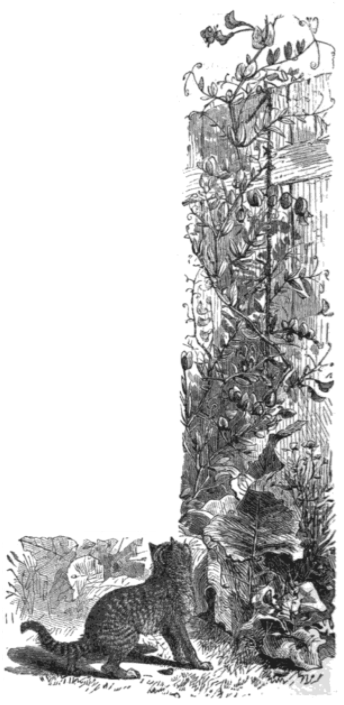
“She took a ball of white cord from her pocket, and began at the end of the row, giving to each one a string by which to climb the fence. But there was not quite enough of the white cord. And on this account she gave to one a dark, rough, knotted string, and one was left without any at all.[15]
“Now it has been vastly entertaining for me to follow these two sweet-peas. In fact, nearly all of my leisure time has been spent in watching them, for I have kept the run of them all summer. The one to whom the dark string was given had by no means a contented disposition. As I sat near her one morning, catching flies the best way I could, she made to me the most bitter complaints.
“‘Look across the yard,’ said she. ‘Those plants have all the sunshine, and we have all the shade.’
“I whispered, ‘Wait till afternoon. Then they will have the shade, and you will have the sun. None have the sunshine always. Some shade is good for all.’
“‘Well,’ she said, ‘why is this dark, rough, knotty string given to me? I have a great desire to go up. The yellow-birds sing of fine things to be seen from the fence-top. They sing of gardens blooming with flowers, and of bees, and painted butterflies, and sparkling waters. And I’ve heard that, higher up, the air is pure and sweet. It must be very delightful. But I can never climb by that dark, rough string. I’d rather stay below. The earthworm tells me it is quite pleasant here; and he, for one, never wished to go higher. Robin Runaway is a pleasant playfellow, and sometimes the ladybugs come,—and the ladybugs are quite genteel people. To be sure there is a strong smell of earth, but one gets accustomed to that. I will creep about here and amuse myself with the beetles. This burdock[16] is a fine protection from the rain. Who knows but some day a pleasanter way of climbing may be offered me? Meanwhile, the earthworm and I will be good friends together.’
“My friends, from that hour I watched her course. At first she ran about gayly enough, playing with the beetles and Robin Runaway; but when a young family of weeds sprang up, it became very troublesome to move about. Then the burdock spread out its broad leaves, taking from her every ray of sunshine. Scarcely a breath of pure air could reach her. The singing of the birds sounded far away. She bore one pale, sickly blossom,—no more. And now whoever passes that way may, if he will take the trouble, find her lying there, a yellow, feeble, miserable thing, giving pleasure to none. She has not strength enough to raise herself from the eart.
“But the sweet-pea who had no string given her conducted quite differently. She said, ‘I was not made to creep about here. There is something in me which says, “Go up! go up!” This earthy smell oppresses me. O, if one could only mount to where the birds are singing! I shall never be content to remain here with Robin Runaway and the earthworms. “Up!” is the word.’
“And when the yellow-birds sang to her of the beautiful things to be seen from above,—of gardens, and fountains, and the fragrant breath of flowers,—she could no longer remain quiet, but resolved to find some way of raising herself from the earth. And a pleasure it was for me to watch her progress. First she came to a blade of grass. ‘A blade of grass is not very high,’ said she, ‘but then it leads up, and at the top of this there may be found something higher.’ The blade of grass led her to a poppy-stalk. ‘A poppy-stalk is not very high,’ said she; ‘but it leads up, and who can tell what may be found at the top?’ She soon climbed the poppy, and found there the leaves of a currant-bush. ;A currant-bush is not very high,’ said she, ‘but it leads up, and from its top something may take me much higher.’ At the top of the currant-bush, the air seemed filled with sweetness. This came, although she did not know it, partly from her own blossoms. But the bees knew this, and the painted butterflies. These were constant visitors, and charming company they were. And when the humming-birds came,1why, that was the best of all.
“And it happened that the dark string led higher than all the rest, reaching even as far as the branch of a hawthorn. And now she is where the yellow-birds sing. The air is pure; no smell of earth reaches her there; and she is blooming all over with the flowers that everybody loves. A beautiful garden is spread out beneath, where happy children play, and fountains sparkle in the sun. A delightful place, where the butterflies come, every morning, to tell their dreams, and the birds every evening sing good night to the flowers. For flowers without number are blooming there. The air is full of sweetness. She herself is sweeter than they all. But this she does not know.”
Sweet Kitty Gray ended by giving us
THE BIRDS' GOOD-NIGHT SONG TO THE FLOWERS.
Good night, dear flowers;
Shadows creep along the sky,
Birdies now must homeward fly.
Good night, darling mignonette;
Good night, little violet.
Good night, pink and four-o' clock;
Good night, homely hollyhock.
Good night, feathery feverfew;
Heliotrope, good night to you.
Good night, lily; good night, rose;
Good night, every flower that blows.
Thank you for your lovely bloom,
Thank you for your perfume.
If you did not bloom so brightly,
We could never sing so lightly.
Now fairies wake, the watch to keep,
And birdies all may go to sleep.
Good night, dear flowers.
Diaz, A.M. “The cat’s diary.” Our Young Folks: an illustrated magazine, vol. 5 (1869): 88-98. https://catalog.hathitrust.org/Record/007601761
[1] Unpleasant or repulsive.
[2] A passionate expression of grief or sorrow.
[3] Ancient Egypt is well-known for worshipping cats. According to Barbara S. Lesko, around “forty feline and lioness goddesses appear throughout the history of Egyptian Religion,” the most prominent being Bastet of Bubastis (151). For more about the presence of cats in Egyptian Religion, see The Great Goddesses of Egypt.
[4] To formally end, ban, or put a stop to a behavior or law.
[5] Also known as a porthole, a scuttle window is a small circular window that is usually present on ships but can be placed in buildings.
[6] Happy Minty’s “smellers” are her scent glands, likely her anal scent glands because cats will smell each other’s rears in order to identify each other (Cat Care Center).
[7] It’s noteworthy that the cats see their king’s black fur as beautiful and a symbol of his nobility because historically humans have considered black cats to be symbols of evil or bad luck (Foreman).
[8] It is unclear if Happy Minty is consciously making a joke at the gentleman in yellow’s expense, but the Miss Whiteys clearly catch something funny about her praise. The notion that the gentleman was “born without claws” could be read as an attack on the cat’s masculinity or true catliness, as being without claws would mean he was incapable of hunting his own food and taking care of himself.
[9] A “box” in this context is a slap.
[10] In a charming or chivalrous manner.
[11] The proverb was first printed in The Proverbs and Epigrams of John Heywood in 1562. The full proverb reads, “A cat may looke on a kyng, and what of that. When a cat so lookth: a cat is but a cat” (145).
[12] According to Emily Teeter. the Egyptians saw dreams as a way of accessing another realm of existence, specifically the realm of the gods. They believed that one could communicate with the gods and with the dead through dreams, though Egyptians were also wary of the dangers present in dreams and of nightmares. For more on the role of dreams in Egyptian Religion, see Religion and Ritual in Ancient Egypt.
[13] Descending or flying downward.
[14] This poem lists several different flowering plants that you may be curious about. The Old Farmer’s Almanac website has excellent written, visual, and video resources about gardening and all of the flower species that appear in this story.
[15] Sweat peas are climbing plants, which means they require at least 6 ft of nearby support structures to grow to their full potential. For more on the care and keeping of sweet peas, see Catherine Boeckmann work in The Old Farmer’s Almanac.
[16] Arcticum plants (more commonly known as burdock) have large heart-shaped leaves, hooked burrs, and thick roots. According to Ohio State’s Weed Guide, common burdock is generally considered to be a weed.
Contexts
Nineteenth-century America saw massive shifts in cultural attitudes towards animal cruelty and the need for legislation to protect animals from the kinds of cruelty depicted in “The Cat’s Diary.” While some efforts to legislate violence towards animals occurred in the early 1800s, it was not until 1866 that activist Henry Bergh pushed for the development of anti-cruelty statutes in New York. At the time “The Cat’s Diary” was published, the first piece of comprehensive legislation in the United States to criminalize animal cruelty had passed in the New York Legislature in 1867. For more on the history of anti-cruelty legislation in the United States, see David Favre and Vivien Tsang’s article, “The Development of the Anti-Cruelty Laws During the 1800’s.”
Resources for Further Study
- Cat Care Center. n.d. “Pheromones: A Secret Language Just for Cats.” Accessed October 19, 2020. https://www.catcarecenter.com/services/cats/blog/felines-pheromones-and-claws.
- Foreman, Amanda. “The Dark Lore of Black Cats.” Wall Street Journal, October 18, 2018. https://www.wsj.com/articles/the-dark-lore-of-black-cats-1539881906.
- Lesko, Barbara S. 1999. The Great Goddesses of Egypt. Norman: University of Oklahoma Press.
- Ohio State University. 2020. Ohio Perennial and Biennial Weed Guide. https://www.oardc.ohio-state.edu/weedguide/index.php
- Teeter, Emily. 2011. Religion and Ritual in Ancient Egypt. New York: Cambridge University Press.
- Yankee Publishing Inc. 2020. The Old Farmer’s Almanac. https://www.almanac.com/.
Pedagogy
“The Cat’s Diary” is notable not only for its anthropomorphism of cats, but also for giving voice and personality to insects and plant life. The story is rife with potential for discussion both about the natural behaviors of the various plants and animals and of the sentience or emotional capacity of those same creatures.
- See Carolyn L. Burke and Joby G. Copenhaver’s piece, “Animals as People in Children’s Literature,” for advice on incorporating animal literature into a curriculum or your child’s life.
- See Education World’s Animal Diaries lesson for a creative and educational project idea.
- Visit the ASPCA for ideas on how to discuss animal cruelty with children of various ages.
Contemporary Connections
Writers and content creators continue to craft narratives from the animal perspective and even use the diary format to this day! For a few contemporary takes on the cat diary genre, see “Sad Cat Diary” by Zefrank, Junji Ito’s Cat Diary: Yon & Mu by Junji Ito, and Cat Diaries: Secret Writings of the MEOW Society by Betsy Byars, Betsy Duffey, and Laurie Myers
